#mymetas
Text
Just finished Good Omens 2 and I'm honestly boggling at the Aziraphale hate because yes, his decision led to the angsty cliffhanger, but it makes SO much sense for his character. Not just in a "Religious brainwashing and sunk-cost fallacy" kinda way but also a "Aziraphale has no reason to believe this isn't the perfect solution" way. That scene among the nebula is crucial because it establishes that Crowley loved being an angel—reveled in his ability to create and allow his creations to grow kinda like plants—and the only problem was that someone else was calling the shots, someone who wouldn't listen to his criticism. Aziraphale has also spent 6,000+ years watching Crowley do good, all the while forced to deny the fact that he's "nice" lest embracing his original nature get him into trouble with hell. Now, Metatron comes along with an offer that fixes everything in one fell swoop. Crowley can be an angel again, be nice without censure, his ideas and criticisms will hold weight because he'll be answering to Aziraphale, and they'll be together.
It strikes me that Aziraphale isn't there when Crowley sees Gabriel's trial, ergo he likewise doesn't see the (non)acknowledgement that there's an institutional problem up in Heaven. There just happen to have been two archangels who called it quits. Same when Gabriel blurts that phrase out to Crowley. Aziraphale has always been more blind to the ways in which Heaven is "toxic" (for very understandable reasons) and this season he's continually sheltered from new evidence of its structural problems. The plot just preaches to the choir: Crowley. He likewise wouldn't see the conflict Gabriel and Beelzebub have caused as evidence of an underlying problem because that's a problem he and Crowley will no longer share. Why would they be worried about Heaven still being unable to accept partnerships between angels and demons when Crowley will no longer be a demon? And that's something he presumably wants based on Aziraphale's memories of him and the ongoing admission that he's lonely.
The way I see it, they got what they thought they wanted at the start of Season 2. Heaven and Hell are keeping an eye on them, but functionally they're left alone. Crowley can spend all the time he wants with Aziraphale and nothing comes of that except that they're both continually named traitors and the higher-ups grumble about it. If Gabriel had never shown up, things should have been perfect based on Crowley's "Let's just run away and have each other's company" standards. Better, even, considering that they get to be together on their beloved Earth, rather than being bored out in Alpha Centauri without any sushi, plants, books, or Bentleys. And yet... Crowley doesn't strike me as particularly happy. Because, you know, based on that kiss he wants to be with Aziraphale, not just literally be with him, but the point of this post is that his "Let's run away and be an 'us'" falls totally flat when he doesn't explain that specific desire to Aziraphale; the desire to change what an 'us' means. From Aziraphale's perspective they're already an 'us.' That was the entire point of "our side" in Season 1 and now they can continue to be 'us' up in Heaven. Plus, Aziraphale likely sees this as a sacrifice on his part. He will give up his bookshop, his Earthly indulgences, take on the responsibilities of leadership (which I don't think he actually wants for a variety of reasons), and spend the rest of eternity in a place where he's felt so small because he thinks that's what Crowley wants. Crowley was happy as an angel. Crowley wanted them to be together without risk of permanent discorporation. They were able to achieve that after not-Armageddon and he still wasn't happy... so surely those two things together will do the trick. Crowley never actually articulates how he wants their relationship to change and the kiss comes much too late, when he's already rejected what Aziraphale must see as a perfect, selfless solution he's secured for them. Even if Crowley wasn't always moving too fast for him, an overture of romance isn't going to go well after that.
Is this crushing and angsty and devastating as a hiatus? Damn straight, my heart it breaking. But it's a good setup. More importantly, it makes perfect sense for their characters, particularly when they're still talking past one another. Aziraphale is someone who has always moved more slowly as a matter of course, as an angel he has remained immersed in the rhetoric of Heaven, his main avenue of breaking free of that (Crowley) has a huge communication problem (to say nothing of his own denial. He only made headway with the help of Nina and Maggie, seconds before Aziraphale shows up), and Metatron (in a no doubt incredibly manipulative manner) has just offered Aziraphale a job that presumably makes him happy AND Crowley happy AND allows him to maintain the moral this-is-how-the-universe-works perspective he's had since he was literally created. Of course he's going to say yes to all that!! And sure, there are problems in Heaven, Aziraphale isn't completely blind, but he can fix them now that he's in charge. How? Well... he'll figure that out later! Kinda like how he's been making plans on the fly this entire season. That seems logical from his perspective, right? It's not like he's gotten a crash-course in the concept of the master's tools never being able to dismantle the master's house...
#Good Omens#Good Omens spoilers#Good Omens 2#Good Omens 2 spoilers#GO2#GO2 spoilers#mymetas#this is so rough and I'll probably write better metas later#but I just have FEELINGS RIGHT NOW OKAY
3K notes
·
View notes
Text
Aziraphale’s Choice, the Job Connection, and Michael Sheen’s Morality
Update: Michael Sheen liked this post on Twitter, so I'm fairly certain there is a lot of validity to it.
I’ve had time to process Aziraphale’s choice at the end of Season 2. And I think only blaming the religious trauma misses something important in Aziraphale’s character. I think what happened was also Aziraphale’s own conscious choice––as a growth from his trauma, in fact. Hear me out.
Since November 2022 I’ve been haunted by something Michael Sheen said at the MCM London Comic Con. At the Q&A, someone asked him about which fantasy creature he enjoyed playing most and Michael (bless him, truly) veered on a tangent about angels and goodness and how, specifically,
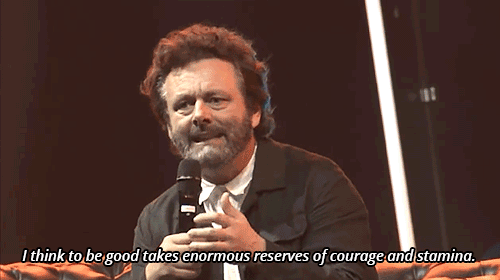
We as a society tend to sort of undervalue goodness. It’s sort of seen as sort of somehow weak and a bit nimby and “oh it’s nice.” And I think to be good takes enormous reserves of courage and stamina. I mean, you have to look the dark in the face to be truly good and to be truly of the light…. The idea that goodness is somehow lesser and less interesting and not as kind of muscular and as passionate and as fierce as evil somehow and darkness, I think is nonsense. The idea of being able to portray an angel, a being of love. I love seeing the things people have put online about angels being ferocious creatures, and I love that. I think that’s a really good representation of what goodness can be, what it should be, I suppose.
I was looking forward to BAMF!Aziraphale all season long, and I think that’s what we got in the end. Remember Neil said that the Job minisode was important for Aziraphale’s story. Remember how Aziraphale sat on that rock and reconciled to himself that he MUST go to Hell, because he lied and thwarted the will of God. He believed that––truly, honestly, with the faith of a child, but the bravery of a soldier.
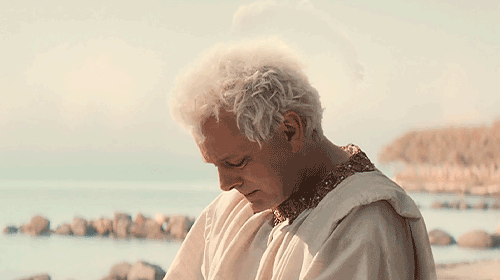
Aziraphale, a being of love with more goodness than all of Heaven combined, believed he needed to walk through the Gates of Hell because it was the Right Thing to do. (Like Job, he didn’t understand his sin but believed he needed to sacrifice his happiness to do the Right Thing.)
That’s why we saw Aziraphale as a soldier this season: the bookshop battle, the halo. But yes, the ending as well.
Because Aziraphale never wanted to go to Heaven, and he never wanted to go there without Crowley.
But it was Crowley who taught him that he could, even SHOULD, act when his moral heart told him something was wrong. While Crowley was willing to run away and let the world burn, it was Aziraphale (in that bandstand at the end of the world) who stood his ground and said No. We can make a difference. We can save everyone.

And Aziraphale knew he could not give up the ace up his sleeve (his position as an angel) to talk to God and make them see the truth in his heart.
I was messed up by Ineffable Bureaucracy (Boxfly) getting their happy ending when our Ineffable Husbands didn’t, but I see now that them running away served to prove something to Aziraphale. (And I am fully convinced that Gabriel and Beelzebub saw the example of the Ineffables at the Not-pocalypse and took inspiration from them for choosing to ditch their respective sides)
But my point is that Aziraphale saw them, and in some ways, they looked like him and Crowley. And he saw how Gabriel, the biggest bully in Heaven, was also like him in a way (a being capable of love) and also just a child when he wasn’t influenced by the poison of Heaven. Muriel, too, wasn’t a bad person. The Metatron also seemed to have grown more flexible with his morality (from Aziraphale's perspective). Like Earth, Heaven was shades of (light?) gray.
Aziraphale is too good an angel not to believe in hope. Or forgiveness (something he’s very good at it).
Aziraphale has been scarred by Heaven all his life. But with the cracks in Heaven’s armor (cracks he and Crowley helped create), Aziraphale is seeing something else. A chance to change them. They did terrible things to him, but he is better than them, and because of Crowley, he feels ready to face them.
(Will it work? Can Heaven change, institutionally? Probably not, but I can't blame Aziraphale for trying.)
At the cafe, the Metatron said something big was coming in the Great Plan. Aziraphale knows how trapped he had felt when he didn’t have God’s ear the first time something huge happened in the Big Plan. He can’t take a chance again to risk the world by not having a foot in the door of Heaven. That’s why we saw individual human deaths (or the threat of death) so much more this season: Elspeth, Wee Morag, Job’s children, the 1940s magician. Aziraphale almost killed a child when he couldn’t get through to God, and he’s not going through that again.
“We could make a difference.” We could save everyone.

Remember what Michael Sheen said about courage and doing good––and having to “look the dark in the face to be truly good.” That’s what happened when Aziraphale was willing to go to Hell for his actions. That’s what happened when he decided he had to go to Heaven, where he had been abused and belittled and made to feel small. He decided to willingly go into the Lion’s Den, to face his abusers and his anxiety, to make them better so that they would not try to destroy the world again.
Him, just one angel. He needed Crowley to be there with him, to help him be brave, to ask the questions that Heaven needed to hear, to tell them God was wrong. Crowley is the inspiration that drives Aziraphale’s change, Crowley is the engine that fuels Aziraphale’s courage.
But then Crowley tells him that going to Heaven is stupid. That they don’t need Heaven. And he’s right. Aziraphale knows he’s right.
Aziraphale doesn’t need Heaven; Heaven needs him. They just don’t know how much they need him, or how much humanity needs him there, too. (If everyone who ran for office was corrupt, how can the system change?)
Terry Pratchett (in the Discworld book, Small Gods) is scathing of God, organized religion, and the corrupt people religion empowers, but he is sympathetic to the individual who has real, pure faith and a good heart. In fact, the everyman protagonist of Small Gods is a better person than the god he serves, and in the end, he ends up changing the church to be better, more open-minded, and more humanist than god could ever do alone.
Aziraphale is willing to go to the darkest places to do the Right Thing, and Heaven is no exception. When Crowley says that Heaven is toxic, that’s exactly why Aziraphale knows he needs to go there. “You’re exactly is different from my exactly.”
____
In the aftermath of Trump's election in the US, Brexit happened in 2018. Michael Sheen felt compelled to figure out what was going on in his country after this shock. But he was living in Los Angeles with Sarah Silverman at the time, and she also wanted to become more politically active in the US.
Sheen: “I felt a responsibility to do something, but it [meant] coming back [to Britain] – which was difficult for us, because we were very important to each other. But we both acknowledge that each of us had to do what we needed to do.” In the end, they split up and Michael moved back to the UK.
Sometimes doing the Right Thing means sacrificing your own happiness. Sometimes it means going to Hell. Sometimes it means going to Heaven. Sometimes it means losing a relationship.
And that’s why what happened in the end was so difficult for Aziraphale. Because he loves Crowley desperately. He wants to be together. He wanted that kiss for thousands of years. He knows that taking command of Heaven means they would never again have to bow to the demands of a God they couldn’t understand, or run from a Hell who still came after them. They could change the rules of the game.
And he’s still going to do that. But it hurts him that he has to do that alone.
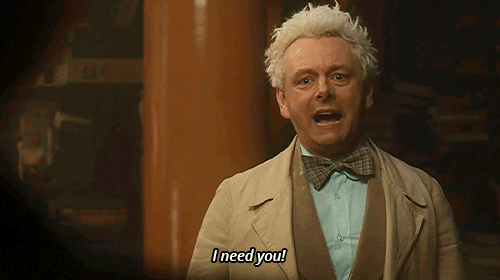
#good omens#good omens 2#ineffable husbands#it's kinda like capt america: civil war#with Azi as Tony Stark: traumatized and trying to do the right thing#and Crowley being Steve Rogers: fuck the establishment let's go rogue#gos2spoilers#good omens meta#good omens 2 meta#go s2#michael sheen#go s2 meta#go meta#*mine#*mymeta#ineffables husbands#ineffable soulmates#*mybest
11K notes
·
View notes
Text
I really really love the language both Misha and Jensen have been using re: the "confession"
Like Misha repeatedly stating "homosexual declaration of love"
declaration: a formal or explicit statement or announcement. announcement. proclamation.
It's just, stating something, making it known.
Then there's Jensen correcting himself from saying "confession" to "testament"
Jensen: "he gave a confess- or he gave his - his testament"
testament: something that serves as a sign or evidence of a specified fact, event, or quality. a tangible proof or tribute. an expression of conviction. creed. attestation. related to testimony: a solemn declaration. an open acknowledgment.
These words are more neutral / positive statements than "confession." Cas's feelings just are, and he is declaring them proudly, attesting** to them. Speaking his truth. Whereas "confession" connotes shame.
confession:
a formal statement admitting that one is guilty of a crime.
an admission or acknowledgment that one has done something that one is ashamed or embarrassed about.
a formal admission of one's sins with repentance and desire of absolution
All of these imply that something about what is "confessed" is shameful, embarrassing, sinful. There's guilt associated with the "confessed" thing, and that's not what Cas felt in the moment of his True Happiness.
In that moment he felt proud, he felt elated to finally declare his feelings, and also in his speech to Dean, which imo is a big part of Cas's happiness, getting to tell Dean how he sees him, how many actually see him, as a being of love, as someone who is always trying and fighting for others. as someone who loves so fiercely and strongly that he taught Cas how to love in this way too. And none of those feelings are shameful, he's proud to tell Dean these things. He's happy to finally get to say them.
So I really like the language they're personally using when talking about this scene. It's really not a confession. Cas's love isn't some secret, shameful thing. In that moment all those feelings burn brightly, happily in him. In that moment he is making his solemn declaration to Dean about his feelings and all the things about Dean that he loves, openly acknowledging what has sat quietly between them for years, not hidden, not shameful, just unspoken.
**to show, say, or prove that something exists or is true
1K notes
·
View notes
Text
ngl with how heavy-handed Fionna and Cake is presenting the themes of Simon doing dad-coded stuff,
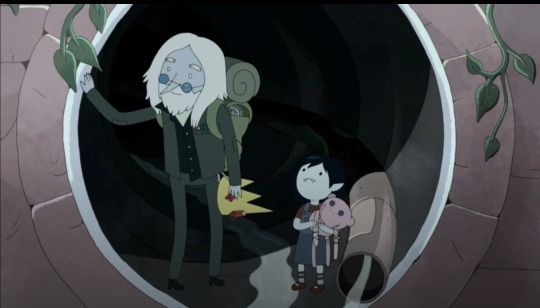
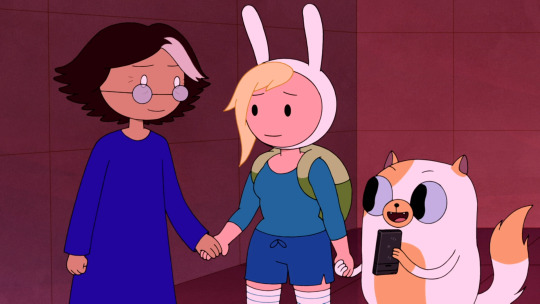
and obviously wanting to be a dad,
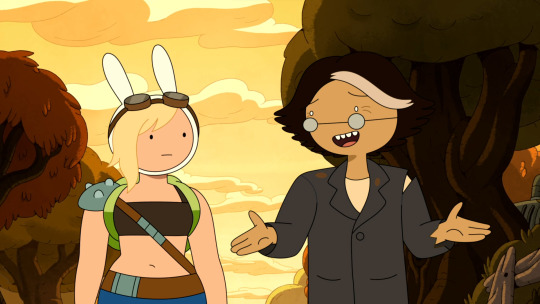
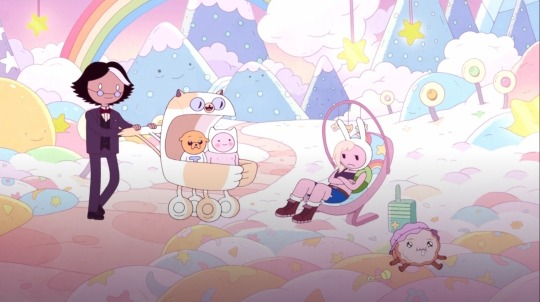
I wouldn't be surprised at all if it was all building to something. To what, I don't know yet. But I feel it has to be something.
2K notes
·
View notes
Text
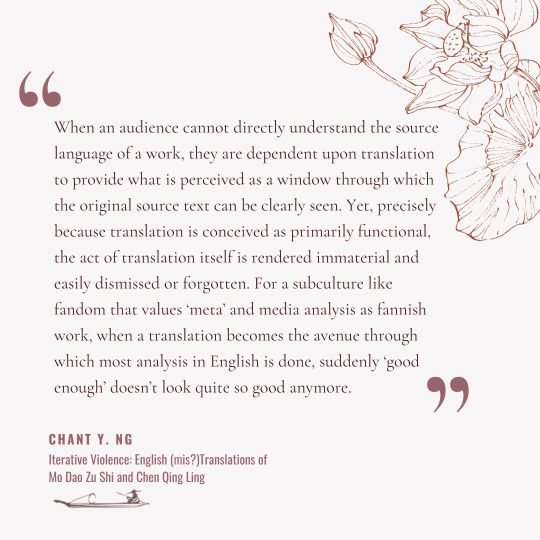
Chapter Spotlight 4:
"Iterative Violence: English (mis?)Translations of Modao Zushi and Chen Qing Ling" by Chant Y. Ng
Describe your topic/chapter in one sentence/one meme/140 characters.
A work by any other translation would NOT smell as sweet!!! In fact!!!!
What drew you to this topic?
Hi yes it's me, your pal cyan, you may know me from such hit posts as 8k words of rage-crying about the translation of 知己 as soulmates (which is about translation as violence), or maybe that other one about translation as violence (shockingly, it's really about translation as violence), or perhaps even that other other one about how one might translate Lan Xichen's title— (you know, I think this one is also about translation as violence)
If there’s one thing you hope the fandom takes away from your article, what would it be?
I hope that people think harder about how impossible it is to translate a text, and that they choose to extend more grace and compassion to authors and translators alike. A translation is not a window but a painting. Also, I'm manifesting better pay and respect for the work of translation into the cosmos. Please consider this a memo I am posting on the great message board of the universe. Thank you.
What is your MDZS/CQL origin story? (i.e. how did you come to this text?)
Started watching, made some gifs, read the book. Had a breakdown. Bon appetit.
Favorite adaptation, if any?
Audio drama! The love, care and effort put into it continues to astound me. Sometimes, to get the sound of a dizi hitting the ground, you gotta throw a dizi on the ground, y'know?
If you were isekai-ed into MDZS/CQL, what sect affiliation would you choose and why?
Please let me live my life in peace, I am but a feeble scholar.
Most compelling relationship in the text?
Twin Jades!!!!
Chaotic one-sentence pitch to get your friends into MDZS/CQL?
*gripping you tightly by the shoulders* don't
If you could ask MXTX one question, what would it be?
你最近怎么样啊?
Anything to say to potential readers of the collection?
Thanks for checking us out! It's been a wild and unpredictable (four-year!!) ride but everyone worked very hard on their parts. Means a lot even if you're just here for our little promo. :) If you'd like a copy of my contribution for classroom use, please do reach out!
You can find Chant (cyan) here on Tumblr @pumpkinpaix.
(FAQ)
(all posts on Catching Chen Qing Ling)
#MDZS#CQL#The Untamed#Grandmaster of Demonic Cultivation#Catching Chen Qing Ling#CQL academic collection#CQL CFP#Chen Qing Ling#Mo Dao Zu Shi#pick up what we're putting down!!!!!#mine#mymeta#CQL meta#MDZS meta
234 notes
·
View notes
Text
That sentiment of "there are two cringe phrases everyone has to say (thank you, and I'm sorry) and if you don't, some day you'll be saying them through tears"
And Lan Wangji telling Wei Wuxian, "between us, there is no need for thank you or sorry"
As if he's reassuring Wei Wuxian, that between them, no matter what, there will never come a time where there will be regret or repressed negative emotions
Wei Wuxian, whose life until then had been just that - with angrily bitten back, barely hidden resentment and we need you now, so u can stay but u are not welcome in this space. That would have a very special meaning
Where, no matter what, next to me is a place that is yours, here is a home you can keep and stay.
#mdzs#wangxian#wei wuxian#lan wangji#chen qing ling#the untamed#mypost#mdzs thoughts#mymeta#placemaking
94 notes
·
View notes
Text
This has probably already been said, but I have to talk about the courtroom scene and why it was a fantastic introduction to not only Levi, but Erwin too—and their relationship.
So we first meet Levi in the heat of battle. We see very quickly the type of fighter he is—confident, but not overly so. He has a strong command of himself and the people under him. He’s The Guy.
Then Erwin shows up and announces they’re pulling back—Levi immediately argues this. We might assume Levi is being set up as the guy who ~doesn’t do well with authority.~ You know the type. He does his own thing. Doesn’t play well with others. Chafes under orders. He’s too big and too important for all of that!
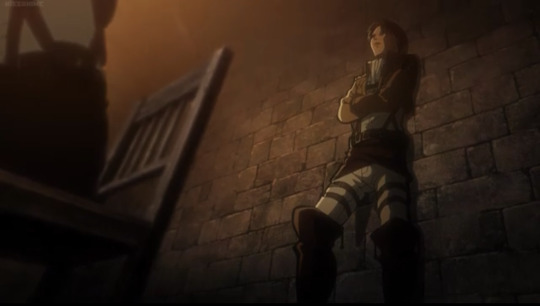

This impression continues when Eren meets Levi and Erwin in the dungeon. Levi is rude and mouthy, and Erwin’s chastisements do little to curb this. Levi’s confidence and skill give him authority issues…right?
So then we move to the courtroom scene, Eren’s trial. Erwin says beforehand that he has a plan, but we’re told nothing more. We see him propose to the court that Eren be given to the Scouts, and he says nothing more.

Levi is the one to scathingly go after the MPs during the debate, pointing out the flaws in their plan and how likely it is that they’re trying to save their own skin. First time viewers might assume that, again, while Erwin is a charismatic leader, he doesn’t go far enough. Levi is the one to say the quiet part out loud, to go to the places Erwin’s too ~respectable~ to go.
Then things start to go sideways. The court’s favor seems to be turning against Eren and the Scouts, fear and paranoia winning out. Eren is getting desperate.
Enter Levi.
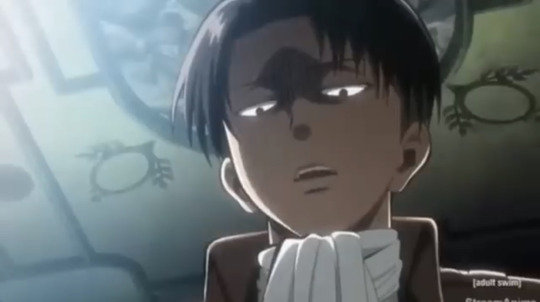
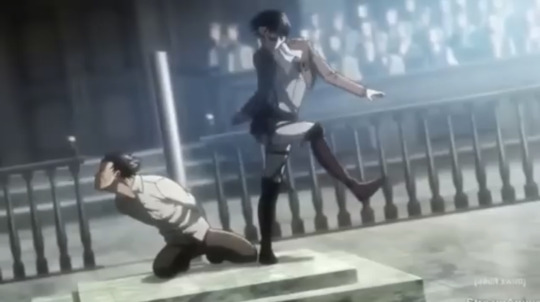
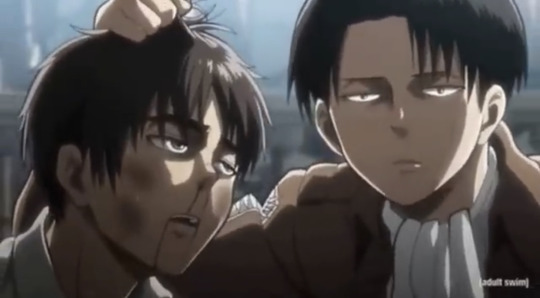
And we get this glorious scene. Levi convinces the court that Eren is harmless to the likes of someone like him. Their best bet is to do what Erwin asked and give Eren to the Scouts. Please.
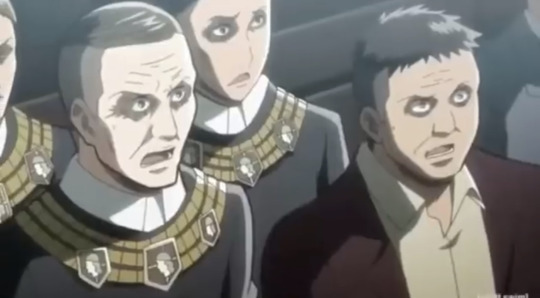
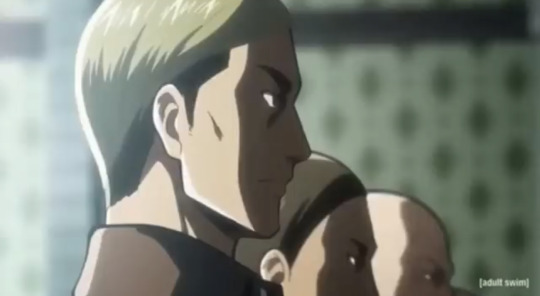
(Notice how Erwin is not shocked, nor does he try to stop Levi.)
Now again, to a first time viewer, this scene feeds into our preconceived notion of Levi. He’s the guy who isn’t deterred by silly things like rank or authority. He saw that things weren’t going Erwin’s way, so he took matters into his own hands. Maybe Erwin will be mad about this later, but Levi will shrug and roll his eyes and say “but I got results, didn’t I?” and Erwin will have no argument for that.
…Right?
Cut to the next scene, after the court has granted the Scouts custody of Eren—and Erwin’s like, “sooo…sorry about that. We had to make it look good.”
This whole thing was planned by Erwin.
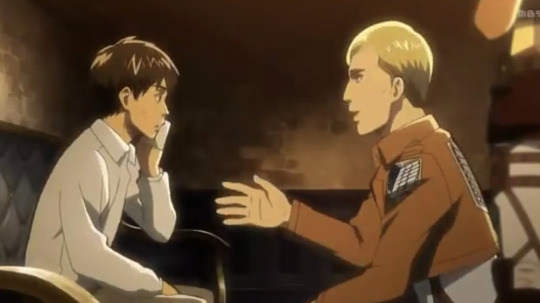
The scene was more or less staged by the Scouts. Erwin wanted to present himself as the calm, collected leader with clean hands. And Levi was the one to do the dirty work, be the brutalizer—even though it was all on Erwin’s orders.
He’ll play that role. He’ll be the rogue, the rough one, the problem child, because his personality fits so well into that niche anyway. But he does it because Erwin wanted him to. If Erwin had wanted him to stand nice and quiet the entire time during the trial, if that’s what needed to be done, Levi would’ve done that instead. He’s not looking to get results; he trusts Erwin’s methods and does what he’s told.
And in this case, he was told to beat up this helpless brat. Gladly.
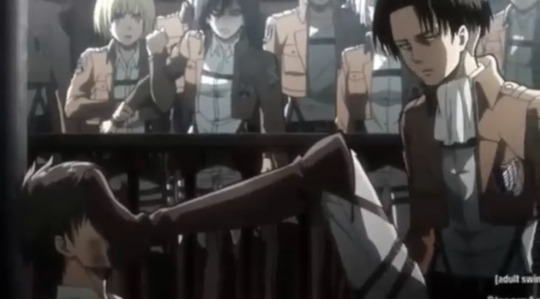
(How much do you want to bet one of the MPs said to Erwin after, “you need to keep your dog under control.” I would simply implode.)
Like, if this display will land anyone in trouble, it wouldn’t be Erwin—it would be Levi. Levi’s the one who got violent and mouthy during a military trial. He broke rank. He attacked the defendant. Erwin isn’t, ostensibly, responsible for this at all. Levi willingly put himself in that position because he trusted Erwin.
And so everything we thought we knew about Levi is turned on its head! Eren even says so in the next episode—he expresses surprise that Levi’s so diligent about following orders.
Eren, silly boy, assumes that being skilled means you don’t have to take orders from anyone. But Levi does. It’s his whole character. (Notice how, despite him ending up being the oldest member of the Scouts, he’s never in line for Commander? He’s the hands, not the head.)
And this whole thing provides so much insight into Erwin’s character as well! Pyxis says at the beginning of the episode that Erwin is very straight-laced. Well, by the end of the episode, we can see that’s…not quite true.
Erwin is conniving, willing to play dirty, do whatever it takes, to get things to go his way. All while keeping his own hands clean, maintaining the image of the honorable Commander. He simply uses the tools at his disposal (Levi) to do the dirty bits for him.
It’s a fantastic introduction to the Scouts, their leader, and his right hand (or is it the left hand that does the dirty work?)
#attack on titan#shingeki no kyojin#levi ackerman#erwin smith#aot#snk#eruri#i am tagging it that but it doesn’t have to be#mymeta#kylerrambles#this of course is not an indictment of either character i LOVE what this says about them!#it’s good character writing!#there! i made a meta post!#feels good to ramble lol
743 notes
·
View notes
Text
Jon Snow certainly has a type, but it's based on personality not on physical looks. The two girls we see he has taken an interest at, Ygritte and Val, couldn't look more different. The first is short, skinny girl with a round face and a shaggy mop of red hair. The second is a slender girl with full blossom, high sharp cheekbones and honey colored hair. What do they have in common? Both are brave and fierce.
So the mentality that "Jon Snow only likes redheads" is a misconception that has no canon basis. After all, Jon meets another woman with red hair after Ygritte's death, Melisandre, and he at best tolerates her presence on Castle Black.
As for Ygritte, it's not her red hair the trait Jon likes about her. He does mention that the freefolk consider her a great beauty because of her hair but himself only started to like several aspects of herself- physical traits included- as he got to know her.


(ASOS, JON II)
95 notes
·
View notes
Text
Sacrifice vs Suicide.
I'm rereading ftws metas and one thing finally came together in my mind.
@fitztragedy once said she didn't recognize Bloom's death as suicide, since she's doing this to save others, therefore it is a sacrifice. I disagree.
Sacrifice implies there's no other alternative. Either the hero dies or a horrible pain/death will be inflicted upon others. This is how Bloom tries to frame her leaving as. She has to close the portal from the inside, otherwise bad things will happen! Don't you get it, Sky, there's no other option.
However Sky calls her out and so does the narrative. All through the season Bloom is constantly portrayed isolating herself and while she grows to embrace her powers, even cherish them, she is still shown being burdened by the dragon flame. That's why she entertains the idea of giving it away, the camera lingers when Sebastian says it, Bloom lingers. "You're a teenager, you should be doing teenager things."
Her emotions and her powers are a threat in Bloom's eyes, something she proves to herself when she nearly nukes the school after Sky's death. She's a danger and she must be locked away.
She has to close the portal, otherwise....? Otherwise what exactly? We don't know, we know pain and suffering will follow, but is her being shunned away gonna help or harm their cause? Does it matter, really?
There has to be another way. I don't think you wanna try, I think you've been looking for a way out.
She doesn't argue against this line from Sky. It's not a sacrifice, it's not a matter of life or death, split minute decision. It's a deliberate choice to shun herself from the narrative, after she has proven to herself and other's time and time again that she's dangerous, volatile and unbelonging. This is why Stella's letter, saying these exact same things, get to Bloom so much. This is why she accepts 20 years of being frozen as a punishment, this is why crossing over seems like the only option.
It's not sacrifice if you're choosing it to punish yourself, it's not sacrifice if you being alive and helping would probably be the best option for all involved, it's not sacrifice if you're not even willing to look for other ways, it's not sacrifice if you're trying to convince others of it. It's suicide.
#only took me a year to put this into words#dont worry about it lol#fate the winx saga#fate: the winx saga#mymeta#bloom peters
19 notes
·
View notes
Text
I think there's a Zewu-Jun reading of the MDZS story. It's not the reading than necessarily follows, privileges or sympathises with character Lan Xichen, but a reading that takes his perspective.
If you conflate something multidimensional and colourful as human morality into a greyscale then of course you are going to end up with a picture in which everyone is morally gray. This is an artifact of your perception not of the story you're presented with. Multidimensionality, multitude of colours does not mean there are no clear right and wrong, although not everything in the story can or even needs to be understood in this way. Seeing the character as "morally gray" is not a proof of nuanced reading. On the contrary it indicates oversimplification.
If you see everything as gray, then you don't the motivation to maintain justice. You can support your friend, who is merely a slightly different shade of gray to you, even if you, or someone else dig anything suspicious up, it's still gray all the way down.
For MDSZ saying that everyone had reasons for what they did therefore they are equally justified you'd end up with Zewu-Jun reading of the story. It's a reading of someone who has all appearances of reasonableness but is unwilling to go out of their comfort zone and examine the situation thoroughly. Of someone unwilling to take a stance. Of someone, who on the one hand would try to enforce false neutrality on the situations that aren't and on the other who is greatly influenced by personal sympathies in their judgment to the point they won't necessarily go beyond that.
The Zewu-Jun reading is, I wager, not the intended interpretation of the text.
18 notes
·
View notes
Text
Lost Knowledge of the Old
House of the Dragon Era:
Viserys the King has revealed the dream of Aegon the Conqueror, called it a Song of Ice and Fire and carried the dagger. The Targaryens have a duty to prepare the realm from the danger coming from the North and the Long Night.
Cregan Stark the head of the Stark House and protector of the North revealed to Prince Jacaerys that dragons refused to cross the Wall. Either because the Dragons sensed the danger ahead (given how Dragons existed for centuries at that point, some survived the Doom of Valyria and are said to be intelligent creatures) or because the Wall had a magic deterrent of sorts.
Also joining the Night Watch was an honor and an important duty.
Fast Forward to the Game of Thrones Era:
Magic has died and it is once reborn.
Let us suspend disbelief and say that given how magic is now resurfacing again it is unpredictable and so Drogon can grow incredibly fast for his age (given what we are seeing in HotD) and Dragons can cross the wall either because they do not sense the danger -either as instinct or because as intelligent creatures they no longer possess the knowledge of their ancestors, as they are brand new. Or because the magic of the Wall (if it ever existed) has been weakened considerably or left no tangible traces. Let us even say that at this point Melisandre has the sight but can't translate it correctly given how it gets to her in parts and pieces and all the knowledge that should have been preserved is long gone.
The Targaryen Dynasty has fallen and the legend of the song of an ice and fire that supposedly was meant to be their duty (I am saying supposedly because translating prophecies and dreams can't be that clear as it has proven to be) is forgotten along with the dagger the Targaryens also lost.
The Starks more due to tradition the seem to be sending some of their relatives to the wall (Ned's brother, Jon Snow) but at this point no one is taking that duty seriously so this knowledge also got lost somewhere in the past.
So given the connection between the myths and legends at this point House of the Dragon could be working on an INCREDIBLE lore. That could lead to the Game of Thrones where the missing pieces of history are coming together to face the Long Night as the most terrible danger against humankind and everything in existence.
That is very exciting and could work in the narrative making House of the Dragon a very exciting addition to the ASOIAF Universe but here are is the thing...
...Even if I set aside the weak writing of HotD that leaves more to imagination than the actual show and join the hype THEN I get to remember how Game of Thrones resolved the Long Night and I just...deflate.

#hotd#got#house of the dragon#game of thrones#house targaryen#house stark#spoilers#analysis#mymeta#I mean all this is meant to lead to a CLIMAX#Where is it?#Like the Long Night was meant to be such a threat#civilizations have risen and fallen and all predicted it#and what did we get?#and the books are not done#I am done
8 notes
·
View notes
Text
Still thinking about "Dot and Bubble."
Specifically, I'm thinking about how the racists of FineTime aren't just written to be cruel and entitled, but downright childish too. Lindy - in a move that dovetails nicely into the episode's commentary on social media - has the attention span of a toddler, going on and on about how boring work is even though, from what we're shown, she doesn't have to do anything other than sit there and socialize, which is presumably what she'd be doing if she didn't have to work, right? But since this is something she has to do per orders of the gross old people, she complains. "You're no fun!" she yells at Gothic Paul, the only one in her group taking a mature stance on this issue (and, notably, the only one with a very small number of subscribers).
Lindy lacks the maturity and critical thinking skills we would expect from someone her age. Again, this is definitely a layer of the social media side of the episode's thesis, but she nevertheless demonstrates a kind of emotional dysregulation that's usually only seen in younger, developing children. Lindy does not think for herself and cannot adapt to changes in routine/the way things are "supposed" to be. When told a fact - the police are unavailable - Lindy repeats, "but I really need the police" over and over as if her need is going to magic up a change in reality. She parrots rules and rejects them in equal measure, driven solely by her current desires: "We don't do that [lower the bubble]."/"I can do whatever I want!" She moves from disgusted to infatuated to angry in the blink of an eye, with her anger characterized by childish outbursts and language: "Now shut up I hate you, I hate you, I hate you!" When faced with something life-threatening, Lindy's response is to a) distract herself (by watching Ricky) and b) find a hiding place. Even taking her terror into account, she responds to these situations like someone far younger would. If I cover my eyes the bad thing disappears. If I hide under the bed, I'm safe.
And of course, Lindy's body is monitored in the way you would a child's. She's constantly watched by others, both her peers and, presumably, by the Homeworld. She's told when she needs to use the restroom which for me was VERY evocative of a parent speaking to their potty training child, trying to get them to articulate when they need to go by informing them of when it's most likely. Hell, Lindy literally can't walk without the assistance of this AI parent.
Yes, there are plenty of moments that evoke the very stereotypical, entitled teenager - talk of "partying," bragging about clothes, being obsessed with the guy online - but even more, I think, evoke the child. When Lindy plays the recording of "Mummy," smiling shyly at the praise before throwing out the kind of insults you'd expect to hear on an elementary school playground - "You're stupid" - she reads like she's a kid. Which is a hell of a commentary on her racism. The episode doesn't say that Lindy is literally a child (she's not, she even snaps as much). The episode also doesn't try to claim that being childlike equals harmless (quite the opposite). But equating racism with a childish, dangerously inept, can't-even-walk-or-use-the-bathroom-by-herself white woman... damn if that's not a statement.
480 notes
·
View notes
Text
Defining Ineffable Love (or, Aziracrow Learn the Rules of Romance)
(In response to this ask about ineffables and asexuality)
One of the major threads this season was Aziraphale and Crowley asking themselves what exactly is their relationship. Not what it is in terms of how much they love each other. (That's a given.) But what it is in terms of the human implications of their love.
Crowley and Aziraphale definitely come at the relationship with different perspectives, in terms of what they’re willing to admit to the relationship being. I don’t think we can entirely interpret it in human terms.
–David Tennant (source)
For 6000 years, they’ve never put a name on their relationship. They didn’t, because they’re inhuman, genderless, sexless beings and they didn’t grow up (as it were) with labels. And even when they did learn them, they couldn’t say it was love, because admitting that was a death sentence.
All of Aziraphale’s heart eyes and pining could live comfortably in his mind if he never admitted what that said about him as an angel (trauma compartmentalization). Crowley tries desperately to be cruel and nasty to add white noise around the blatant reality of his constant loyalty to Aziraphale. If you don’t put a word to it, it’s not real and they can’t punish you.
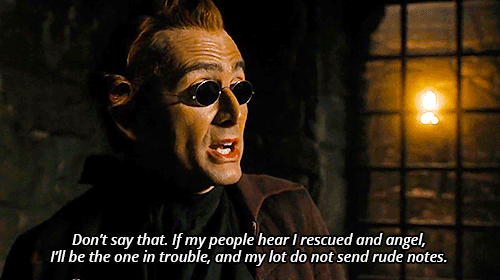
After the Not-pocalypse, for all rights and purposes, Aziraphale and Crowley chose humanity as their identity. We see Aziraphale “playing house” in various human roles (as a landlord, a private eye, a magician).
We even see Crowley intentionally taking on human behavior to handle emotional issues: “Just breathe, that’s what humans do.” They’re slowly and intentionally enculturating themselves into the world they want to belong––earth.
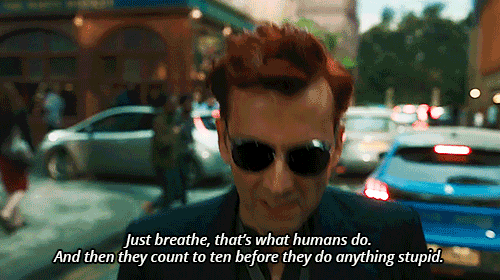
Yet it’s setting up Maggie and Nina that makes Aziraphale and Crowley start thinking about their relationship as a human construct.
Because fundamentally, Aziraphale and Crowley are not human. Like Neil Gaiman tells us constantly, they can’t be defined in human terms when it comes to gender and sexuality. They can shift and move through each and any of those markers at will, purely for the pleasure of the thing: “angels are sexless unless they really want to make an effort.”
IMO that makes them originally asexual, in the sense they were created without the need for sex. And it makes them fundamentally transgender and genderfluid, because while on earth, their sexless, eldritch spiritual bodies take on human, gendered forms and clothing. What gender (and sexuality) they identify with while on earth varies through the eras. Crowley definitely has a fluid gender identity, while Aziraphale appears to have settled on gay man (aka THE southern pansy) for his internal typology (although all of these identities are subject to change).
In the midst of all this fluidity, it’s no wonder Aziraphale and Crowley haven’t thought of their relationship in human terms before. There’s just so much different in them and their bodies than what they see in humanity. And there are no books and songs that show the kind of love they have, in the malleable, sexless bodies they have, with the background they have; it’s all ineffable.
Aziraphale and Crowley didn’t start out thinking they were in a romantic relationship. Whatever feelings they had were long repressed, redefined, and shuttled away. But they did love each other, without question. And it was that love which scared them, because it was bigger than anything they saw among humans, a love that was beautiful and blasphemous and unfathomable.
Kinda like what David Duchovny said about Mulder and Scully in The X-Files, “I don’t know if they’re in love. In a way, their relationship is deeper than that, because they cannot live without each other.”
Now take this profound, ineffable love and drop it into the little boxes and labels human culture has created for itself.
Full disclosure: I’m an asexual demiromantic person in a queerplatonic relationship, so I’ve done a fair bit of research on what romance is and how the rituals of romance are, in many ways, social inventions that vary from culture to culture. There’s love and then there’s romance, and they don’t always overlap. So my interpretation of Aziraphale and Crowley comes through this lens and the fact that Neil Gaiman has affirmed the validity of an ace-spec reading on our ineffables.
Which brings me back to my thesis: That only now are Aziraphale and Crowley thinking of themselves as a romantic couple, precisely because they are interfacing with humans and taking on their social rules.
I like this one asexual person’s description of their experience, which feels very much like our ineffables (from a very good article, I def recommend):
If there is a border between friendship and romance, then in my internal landscape, it goes right through a misty forest where no one has ever bothered to place signs....
Neither of us had intended to start anything even vaguely romantic, but the activities we did and the intense kind of immediate connection we had was coded as romantic in our culture.
That’s what Crowley realizes when Nina confronts him about his relationship to Aziraphale.
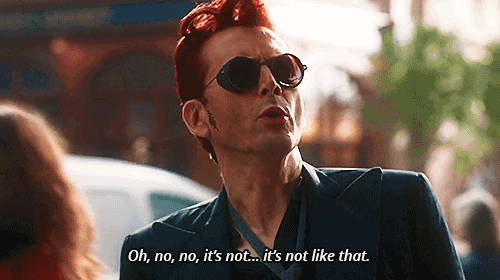
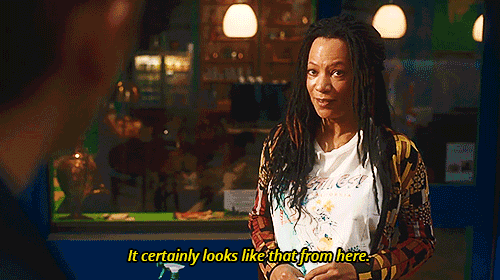
“It looks like that from here.” What Crowley and Aziraphale share is beyond definition, but Nina cannot imagine the anything beyond the human labels she was taught. The tragedy of an everlasting love is that it can only be conveyed properly to other humans if it is cast in such small human words––partner, boyfriend, husband.
Because when Crowley denied those human roles for Aziraphale, Nina slid down the path of thinking Aziraphale was just his “bit on the side,” because there were no labels left she could imagine for them. If you don’t put a word to it, it’s not real.
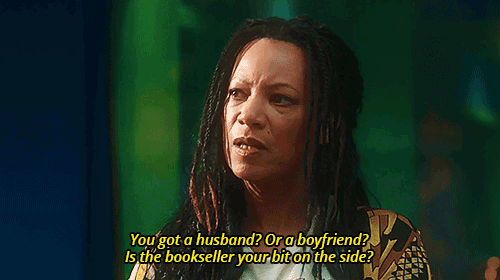
That’s the purpose of labels, to culturally validate a person's identity. Labels, of course, DO NOT create reality; people's experiences are always real, in all their varied ineffability. But labels allow a space for culture (ie other humans and political and legal society) to recognize formally your lived reality.
So Crowley started really thinking about him and Aziraphale, about the ineffable love between them and realized that in human terms, those would be the things he’d call Aziraphale, because those were the words that gave Aziraphale that place of importance in his life.
But with that realization comes all the human trappings and behavioral patterns around those words (the candlelit dinners, dramatic rescues, drinks at the Ritz, etc.) which Crowley had never thought of before, and yet… maybe romance is what he and Aziraphale have been doing all along.
That’s why this season centered so much around Aziraphale and Crowley using cultural artifacts (film and literature) to understand romance, because romance is so deeply socially-defined.
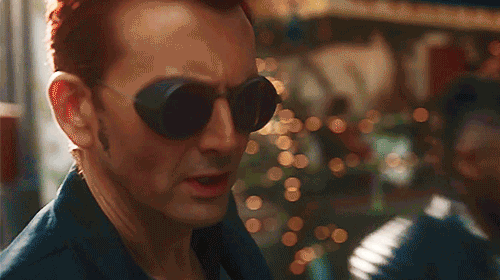
Aziraphale himself has been leaning hard into the romantic social cues (he’s more well-read in the cultural trappings of romance than Crowley is), especially post-Blitz. But when he watches Maggie and Nina dancing, he works up the courage to do something with Crowley that’s even more explicitly loaded as “traditionally romantic” than anything he’s done up to that point.
Because while risking their lives for each other and defying everything for each other is love in its purest form, dancing (specifically in Jane Austen’s world) is a public performance coded for potential marriage partners. It's an intimate ritual of the entire body. (And in British slang, dancing has been used as a euphemism for sex.)
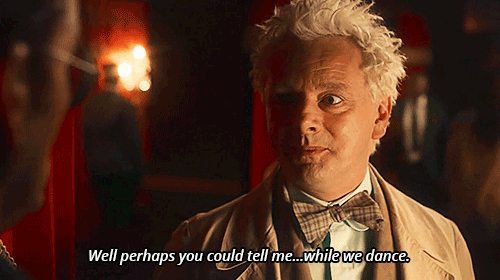
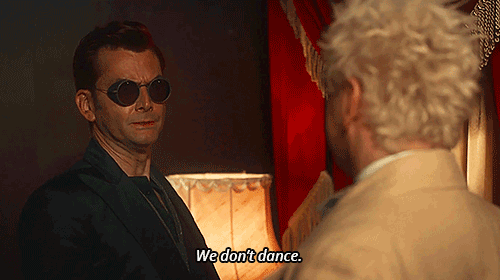
Crowley's "We don't dance" is really telling, because it shows Crowley’s awareness of the unknowable devotion between them vs the human roles Aziraphale is asking him to fill, specifically its physical aspects. Aziraphale is asking to make their relationship more public, more physically explicit, more coded as romantic in a setting specifically intended to couple individuals.
While Maggie and Nina inspired Aziraphale to progress their relationship into a publicly physical direction, Maggie and Nina inspired Crowley to think of the emotional implications of their human roles: the commitment, security, and monogamy of a husband, a partner, an us.
That’s what he decides after Maggie and Nina confront him in the end. “You never say what you’re really thinking.” He wants to codify his relationship so they each become responsible to one another. Aziraphale has always been his soulmate, the one he could always rely on. But he wants to place a word and a role to their love that will bring with it Aziraphale’s commitment and dedication to him.
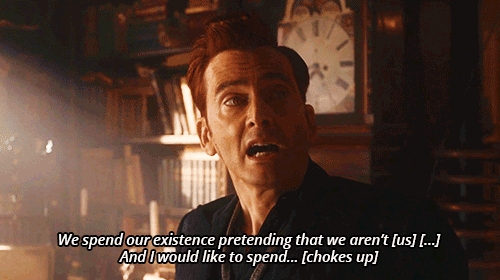
And that's another reason why Crowley kisses Aziraphale, because he knows Aziraphale was willing to make their relationship physical, and he wants that, too. To consummate this bond in the way humans do.
But Crowley doesn’t really know how to kiss; he’s not as worldly as he makes out to be. (It’s Aziraphale who owns the gun, and Crowley who’s never fired one.) He uses the kiss as a tool to get across to Aziraphale what he wants for them, in the physical language Aziraphale has been using, because "one fabulous kiss and we're good," right?
But it doesn’t work, because real life and real emotions don’t work like that; life and love don’t follow a script, despite the novels and plays and songs.
Aziraphale and Crowley spent this entire season trying to figure out what their relationship is and what they wanted out of it, trying to make sense of the unfathomable thing they share and the human implications of it, and not quite landing on the same page.
Part 2 of this Analysis, covering a correction in Crowley’s statement (“You don’t dance”) and the further implications of dancing/sex.
#please see the part 2 listed at the end for an analysis Crowley’s “you don’t dance#good omens#good omens 2#ineffable husbands#go s2 meta#go meta#good omens meta#queer#asexuality#asexual#aromantic#genderfluid#gos2spoilers#go s2#good omens 2 meta#ineffable romance#*mine#*mymeta
2K notes
·
View notes
Text
desitel feelings / love timeline (2 me)
DEAN:
immediate attraction in s4 (hello he has eyes!)
s4 - 5, going from allies to friends, crushing hard and shooting his shot / flirting, but all of it goes over cas's head
s6 betrayal / cas's s7 death: when he starts realizing that the way he feels abt cas is Different and More than just a crush / friendship. bobby and sam not reacting the same way to cas's betrayal and death really starts to get the gears turning. then when bobby dies, dean also realizes his grief over cas is different from his grief over bobby. (also the keeping his coat, carrying it with them in every new car all throughout s7. like that man was in Love-love.)
s8: purgatory solidifies dean's feelings. all dean can think about for a year is finding cas, saving cas. he prays to him every night. his mind is just a skipping record of cas, cas, cas. i think by this point he's accepted his romantic feelings for cas. and by the end of s8 he was ready to tell cas how he felt in the crypt. he changes "love" to "need" (which imo is MORE insane and vulnerable actually) and then dean perceives cas's actions after the crypt as a rejection of dean's feelings). meanwhile, cas has not yet even realized his own feelings for dean are romantic love yet, more on that in a minute.
s9 - s12 imo are dean grappling with the fact that his love is unrequited and trying to live with that and maybe move on (drowley summer of love).
s13 -s14 : first the widowers arc of it all. dean realizing no matter what, cas was IT for him. there's never going to be anyone else for him. he doesn't want anyone else. dean accepting that cas is effectively his life partner and he's fine with them staying platonic (bc he still thinks cas doesn't feel the same way). dean stops hooking up. dean is content with the family unit they have made for themselves.
s15: dean grappling with the knowledge of chuck's manipulation over the years. dean questioning what's even real ("is his love for cas even real?") cas asserting that they are real. divorce arc. destiel miscommunication at its finest. dean once again thinking cas doesn't care for him the way he cares for cas. dean nearly losing cas again in purgatory and deciding to put his heart on the line (was going to confess before cas cut him off). then---cas's "i love you." dean overwhelmed in the moment. dean still not sure what cas's words mean until cas is taken by the empty and he processes the speech and declaration. and then he realizes--cas was in love with him. it was mutual. they could've had it. they could've been together for years. the one thing they both wanted---
CAS
immediate attraction in s4 (hello he has eyes! many eyes in fact!)
s4 - 5: going from allies to friends. cas remembering what it's like to FEEL again ("for the first time") after his millionth lobotomy. dean re-awakening those feelings, both for humanity at large and for dean specifically. but cas doesn't have a name for these feelings yet. he attributes them to his bond with dean / assumes most people feel like this about dean.
s6 - 8: cas largely still attributing his feeling for dean to their unique bond. cas putting the mission first. cas also dealing with his own guilt over his failures. not a lot of time for him to process his feelings for dean.
s9: cas has his italicized "oh" moment. i think it's a combination of being human and for the first time all the angel stuff isn't there, he can't attribute his feelings to their "bond." he's rooted in his body for the first time, really in-tune with his physical reactions too. i think early s9 is when he starts to realize his feelings for dean are different but he's still not quite putting a name to them. then metatron calls him out on those feelings (his snarky knowing "he's in love...with humanity") and then dean dying really solidify cas's feelings. he is now aware.
aaaaaand then s10 - 12 is him grappling with those feelings at the same time that dean is really starting to accept that cas doesn't feel the same and is trying to accept that they'll be nothing but platonic and move on. so that's why you get stuff like dean calling cas their "brother" (he's trying to be ok with this) while cas looks sick to his stomach bc he is just now really accepting and processing the fact that he's in romantic love with dean. gotta love that classic destiel miscommunication, never being on the same page at the same time.
by s13 he's accepted he's in love and is now thinking it's one sided and this is all they'll ever be. he's also still kinda avoiding it all throughout the later seasons, putting the Mission first again, leaving more often, focusing on jack stuff. really just putting his feelings on the back burner.
then s15. just like i said in the dean bullet point, the divorce arc stuff is more classic miscommunication. cas so badly wants dean to ask him to stay. dean so badly wants cas to stop leaving. they both need to just have one good conversation about all of this. anyways, the "i love you." truly i think mr. avoidant cas would have continued to keep his feelings for dean to himself perhaps forever, had it not been a life or death situation where he realized telling dean his feelings would trigger the empty deal. but he does tell him. and my personal headcanon is that when he does tell him he gets hit with a wave of feeling from dean (along with the love in his eyes) that basically confirms to cas that dean actually has felt the same way all this time. and also, i think cas has partially known for a while but let his own self doubt and insecurities convince him that dean couldn't possibly feel the same.
Additionally: i do enjoy another late seasons variation, where BOTH of them have a mutual awareness of each other's feelings, but they both let insecurities and circumstances convince them it's not the right time, or they don't deserve to have this. they keep putting off talking abt this thing between them because there's always another apocalypse or big bad. because saving the world always comes before their own personal desires and happiness. so they keep putting it off until it's too late, until there's no time left. by s15 they're both feeling desperate. it's the end. they both feel they need to say something. dean tries in The Trap. cas finally does in Despair. and then there's just no time left. it's over. they never got to have it. (YET. because their story ain't over!)
anyways, i'm multitudes girlie and can enjoy many different interpretations, esp in fics, but this is my main destiel + feelings interpretation for when i'm watching the show and engaging with canon.
TLDR: they both start Feeling things for each other immediately. dean realizes these feelings are romantic love and puts that name to them first around late s6/s7. dean Accepts these feeling around s8. while cas has his realization that these intense feelings are romantic love around s9. and accepts them at some point between s10 - 12ish.
457 notes
·
View notes
Text
can you imagine you're finding your footing in academia, are engaged to be married to the love of your life, have your entire life ahead of you... and it gets flushed away in an instant because you wanted to put on this silly thing you bought to make your future wife laugh a little? can you imagine experiencing the slow grueling process of ego death, knowing you are losing yourself and your entire identity bit by bit but you can't not put the damn crown on because how else are you going to protect this helpless little girl you've grown attached to? you have no one else to speak of - they all died in the apocalypse after all.
can you imagine fleeting sensations of lucidity on and off for centuries, thinking maybe this is finally the time you can get a grip long enough to try to figure out a way out of this hell?
can you even fathom snapping back to your full conscious identity in an instant in this fantastical, alien world you are far too old to hope to adapt to in a meaningful way in a long-term sense? what about spending the next decade+ suffering with unprocessed trauma that pathetically few could even begin to relate to? or having your entire existence become an attraction for others' entertainment and amusement? hell, even if you die, you won't see the love of your life in whatever afterlife your soul inhabits.
if I were Simon, I don't see myself doing much better.
364 notes
·
View notes
Text
Regarding #EndOTWRacism’s summaries of 2023 OTW Board election candidate positions
Before I begin, let me say now that while I am a volunteer with the OTW, my views are personal and should not be taken as any kind of official statement from the org, its leadership, or other volunteers, especially not the candidates in question. My focus here is on the Asian candidates for obvious reasons, but this post is not meant as endorsement or disavowal of any of the candidates, whose bios and platforms can all be read here.
Do not take this as an excuse harass the mods running EOTWR. I cannot make myself clearer.
--
I am making this post to express my extreme disappointment with End OTW Racism’s post purporting to summarize the platforms of the candidates for the upcoming Board elections. It is no longer rebloggable, but can be read here.
The way that the candidates with Asian names were spoken of is deeply insulting when compared with how candidates with English-language names were discussed. Asian candidates had their platforms misrepresented, their expertise downplayed, and their lived experiences reduced down to “bringing an international presence” to the board, which was then further caveated with, “diversity alone is not going to solve the issue of racist harassment currently allowed in the OTW’s policies and enforcement practice”. While it is true that diversity alone is not a solution, it’s pretty offensive to essentially have “remember! Just because they aren’t white doesn’t mean you should vote for them!” tacked on to one of the Asian candidates’ platforms.
End OTW Racism seems more concerned with whether or not candidates used the buzzwords they wanted to hear rather than with how racism is discussed holistically within the statements. While I can appreciate that EOTWR has a specific agenda, to say things like, “[s]he does not mention racism, racist harassment, or hiring a DEI consultant in her platform, so outside the outreach and support she mentions, there is not enough for us to conclude that these would be priorities for her” regarding Zixin Z.’s position, directly following the statement, “[s]he also mentions the need for outreach towards non-English-speaking fans and has a desire to provide support to volunteers from minority groups” is fucking laughable, especially after the initial mistake of stating that Zixin Z. only wanted to do more outreach to Chinese-speaking fans. Again, I understand that people make mistakes and that this mistake has since been corrected, but I hope it prompts some reflection on the sort of biases that would lead to such a mistake in the first place. It may have been completely innocuous, but in charged discussions about racism, please understand that it gives an impression that is difficult to shake. I do thank you for not trying to hide that this happened.
Why is Anh P.’s lack of discussion on TOS/PAC a point against her, while Zixin Z.’s years of experience on PAC, her role as a mod on Weibo, and her background in nonprofits don’t even warrant a mention? For that matter, why did none of the Asian candidates’ skills or experience warrant mention? Qiao C. and Zixin Z. have both been volunteers with the organization for several years now, and Anh P. has years of moderation and volunteer experience elsewhere prior to her work with the OTW.
It is so fucking frustrating that despite each one of these candidates specifically talking about the need for diverse voices, they had their platforms essentially passed over because they didn’t use the right words, and it is particularly fucking aggravating to see that EOTWR will use Chinese issues as props when trying to press OTW leadership on the racism that occurs within the org, but then completely fail to connect the dots on why these candidates are running because the wrong language was used. Zixin Z. is one of the Weibo mods, for fuck’s sake.
The entire post feels like an exercise in virtue signalling, from every time it was brought up that a candidate did not provide pronouns in their platform statements, despite every one of them having pronouns provided in their bios (why mention this detail at all? You could have simply used the pronouns), to what felt like willful obliviousness to the anti-racism stances in the Asian candidates’ platforms. It feels like the concern starts and ends with racism in Anglophone terms, on Anglophone terms.
I can respect the driving ideas behind EOTWR, even if I disagree with the way that EOTWR pursues their goals. I do believe that we want the same things in the end, and therefore chose not to interact with the many posts I have seen about the protest. However, I saw the summary post and could not let it pass without speaking.
For a protest group supposedly dedicated to ending racism in the OTW, this felt incredibly hypocritical, conscious bias or not. In my most charitable frame of mind, I can see this as misjudging and overcorrecting to ensure that there was no favoritism shown to the obvious non-white candidates lest EOTWR be accused of tokenizing– again, it is true, that diversity in and of itself is not a solution to racism.
In my least charitable and most bitter frame of mind, I feel inclined to wonder if EOTWR, much like the OTW itself, is uncomfortable with the lack of influence they could exude over an international candidate. It would be much, much easier to push their agenda forward with more culturally familiar candidates, particularly white ones. Guilt and public scrutiny are powerful weapons and easy to wield against those with perceived privilege in our current atmosphere, often to the detriment of the actual discussion at hand in my experience. I know that’s cynical. It’s hard not to be. (For clarity's sake: I do not know the other candidates' races. This is a hypothetical.)
This isn’t a demand for an apology. I think we fetishize the capital-A Apology to the point where I find them sort of meaningless unless they are given freely. I don’t need EOTWR to agree with me, and I don’t really want to keep talking about it. Rather, I would prefer that EOTWR take action to do better as they continue in their campaign. What that action is is their decision. If they truly mean to stand against racism in the OTW, then I’d like them to demonstrate it.
--
DO NOT HARASS EOTWR MODS. I AM FUCKING SERIOUS ABOUT THIS.
#endotwracism#votetoendotwracism#organization for transformative works#otw#ao3#archive of our own#fandom#otw board#otw elections#discourse#racism#end otw racism#i'm so so sorry everyone#but i'm upset i really am.#mine#mymeta#i guess.#i mean it i don't really want to talk more about it okay. i will probably mute this post#even if i reblog it a few times#long post#statistically average
630 notes
·
View notes